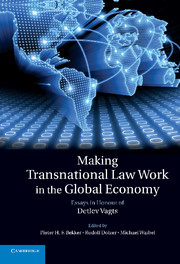Book contents
- Frontmatter
- Contents
- List of contributors
- Foreword: the transnationalism of Detlev Vagts
- List of cases cited
- List of abbreviations and acronyms
- Introduction: a Festschrift to celebrate Detlev Vagts' contributions to transnational law
- 1 Detlev Vagts and the Harvard Law School
- 2 Constructing and developing transnational law: the contribution of Detlev Vagts
- I International law in general
- II Transnational economic law
- III Transnational lawyering and dispute resolution
- 23 Diffusion of law: the International Court of Justice as a court of transnational justice
- 24 Regulating counsel conduct before international arbitral tribunals
- 25 International arbitrators as equity judges
- 26 Customary international law, Congress and the courts: origins of the later-in-time rule
- 27 Mediation and civil justice: a public–private partnership?
- 28 The borders of bias: rectitude in international arbitration
- 29 Managing conflicts between rulings of the World Trade Organization and regional trade tribunals: reflections on the Brazil – Tyres case
- 30 Cross-border bankruptcy as a model for the regulation of international attorneys
- Bibliography of Detlev Vagts
- Index
30 - Cross-border bankruptcy as a model for the regulation of international attorneys
from III - Transnational lawyering and dispute resolution
Published online by Cambridge University Press: 17 November 2010
- Frontmatter
- Contents
- List of contributors
- Foreword: the transnationalism of Detlev Vagts
- List of cases cited
- List of abbreviations and acronyms
- Introduction: a Festschrift to celebrate Detlev Vagts' contributions to transnational law
- 1 Detlev Vagts and the Harvard Law School
- 2 Constructing and developing transnational law: the contribution of Detlev Vagts
- I International law in general
- II Transnational economic law
- III Transnational lawyering and dispute resolution
- 23 Diffusion of law: the International Court of Justice as a court of transnational justice
- 24 Regulating counsel conduct before international arbitral tribunals
- 25 International arbitrators as equity judges
- 26 Customary international law, Congress and the courts: origins of the later-in-time rule
- 27 Mediation and civil justice: a public–private partnership?
- 28 The borders of bias: rectitude in international arbitration
- 29 Managing conflicts between rulings of the World Trade Organization and regional trade tribunals: reflections on the Brazil – Tyres case
- 30 Cross-border bankruptcy as a model for the regulation of international attorneys
- Bibliography of Detlev Vagts
- Index
Summary
Introduction
In 1951, the young Detlev Vagts began working as a lawyer in the Paris office of New York firm Cahill, Gordon & Reindel. Although an American lawyer in Paris would hardly be remarkable today, Vagts' position was extraordinary for its time. Back then, law practice was a predominantly local affair. There was no such thing as a global law firm, and even the largest US firms would be considered minuscule in comparison with today's behemoths. The firms of yesteryear ventured overseas only haltingly, and usually in response to a specific client need rather than as part of a larger mission to establish a global practice. Cahill was one of the very few law firms that had a Paris outpost ‘manned’ by a few lawyers. The most obvious candidates for these overseas postings were lawyers like Vagts, whose personal background included links to foreign jurisdictions.
As Vagts recalls, in the early days of his Paris practice there were no fax machines, let alone internet connections. Transnational phone calls often relied on unstable radio-based connections, and transatlantic flights still had a sense of adventure to them. These technological obstacles limited the internationalisation of law firms, but they also rendered law practice less frenzied and more genteel. Before the arrival of overnight services by FedEx and DHL, as Vagts recalls, an attorney could sigh with relief as he sent off a professional communication by ‘special airmail’, knowing that no response could possibly be received back for at least a week.
- Type
- Chapter
- Information
- Making Transnational Law Work in the Global EconomyEssays in Honour of Detlev Vagts, pp. 630 - 654Publisher: Cambridge University PressPrint publication year: 2010



